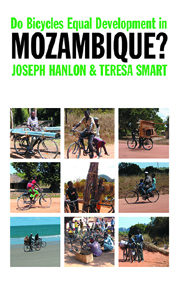Book contents
- Frontmatter
- Contents
- Acknowledgements
- The authors
- Money & measurements
- Abbreviations, acronyms & glossary
- Part I IS THERE DEVELOPMENT IN MOZAMBIQUE?
- 1 Introduction: more bicycles, but …
- 2 A brief history: war, peace & slow recovery
- 3 Can peasants pull Nampula out of poverty?
- 4 The Manica miracle is over
- 5 Cashew: from disaster to export model
- 6 Tobacco: hard choices
- 7 Has poverty decreased?
- 8 Is there development in Mozambique?
- Part II ACTORS & CONTEXT
- Part III ALTERNATIVES & THE DEVELOPMENTAL STATE
- Appendix 1 Aid
- Appendix 2 Investment & other tables
- Bibliography
- Index
7 - Has poverty decreased?
from Part I - IS THERE DEVELOPMENT IN MOZAMBIQUE?
Published online by Cambridge University Press: 05 April 2013
- Frontmatter
- Contents
- Acknowledgements
- The authors
- Money & measurements
- Abbreviations, acronyms & glossary
- Part I IS THERE DEVELOPMENT IN MOZAMBIQUE?
- 1 Introduction: more bicycles, but …
- 2 A brief history: war, peace & slow recovery
- 3 Can peasants pull Nampula out of poverty?
- 4 The Manica miracle is over
- 5 Cashew: from disaster to export model
- 6 Tobacco: hard choices
- 7 Has poverty decreased?
- 8 Is there development in Mozambique?
- Part II ACTORS & CONTEXT
- Part III ALTERNATIVES & THE DEVELOPMENTAL STATE
- Appendix 1 Aid
- Appendix 2 Investment & other tables
- Bibliography
- Index
Summary
Poverty is said to be falling, but malnutrition is rising. How can that be? This chapter explores what UNICEF calls ‘a central paradox in the Mozambican development trend’ (Dupraz et al. 2006: 18).Two key reports agree on the depth of poverty, but disagree on the trend. Poverty ‘levels remain high. More than half the population fails to attain even the very basic standard of living represented by poverty lines,’ according to a 2004 report (Massingarela et al. 2004a: v). ‘Children have poor nutrition in the overwhelming majority of Mozambican households,’ reports UNICEF in its 2006 report (Dupraz et al. 2006: 18).
But is it getting better? UNICEF reports that child malnutrition is actually increasing, while Massingarela et al. claim that the number of people living below the poverty line decreased dramatically from 69% in 1997 to 54% in 2003.These headline figures are used by ministers and donors alike to prove that, although Mozambique remains very poor, development is taking place and poverty is being reduced. Indeed, Massingarela et al. argue that ‘the goal set out in the PARPA of a poverty headcount rate of 60% has, in all likelihood, already been reached’ and that ‘progress in reducing poverty rates has been impressive’.
In this chapter we shall argue that assertions of a decline in poverty are exaggerated and are much less ‘impressive’ than claimed.
- Type
- Chapter
- Information
- Do Bicycles Equal Development in Mozambique? , pp. 57 - 70Publisher: Boydell & BrewerPrint publication year: 2008



